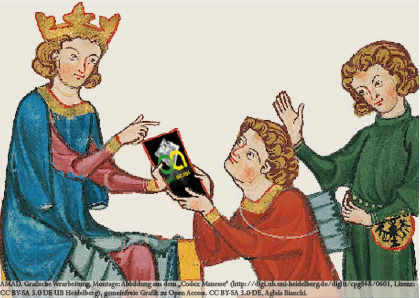AMAD
"Archivum Medii Aevi Digitale - Specialized open access repository for research in the middle ages"To submission

Full metadata record
| DC Field | Value | Language |
|---|---|---|
| Contributor | Wissenschaftszentrum Berlin für Sozialforschung gGmbH | - |
| Author | Konrad, Kai A. | - |
| Date | 2012 | - |
| Other Identifier | http://bibliothek.wzb.eu/pdf/2002/iv02-15.pdf | - |
| Other Identifier | http://nbn-resolving.org/urn:nbn:de:0168-ssoar-112772 | - |
| Other Identifier | http://www.ssoar.info/ssoar/handle/document/11277 | - |
| Other Identifier | http://skylla.wz-berlin.de/pdf/2002/iv02-15.pdf | - |
| URI | https://www.amad.org/jspui/handle/123456789/76413 | - |
| Description | "This paper considers terrorism as an extortion activity. It uses tools from the theory of extortion and from conflict theory to describe how terrorism works, why terrorism is a persistent phenomenon, why terrorism is a violent phenomenon, and how retaliation affects the outcome. The analysis highlights the importance of information aspects and discusses some aspects of the organizational design." (author's abstract) ; "Anhand der frühen terroristischen Organisation der Ismaili aus dem 11. bis 13. Jahrhundert wird deutlich, dass zwischen Schutzgelderpressung und Terrorismus keine klare Trennlinie existiert. Die Ismaili waren zeitweise als Staat organisiert, teilweise eine Organisation ohne eigenes Territorium. Sie nutzten die gleichen Instrumente zur Durchsetzung politischer, religiöser und rein finanzieller Ziele. Diese strukturelle Äquivalenz wird genutzt, um einige Ergebnisse aus der Theorie der Schutzgelderpressung für das Verständnis der Funktionsweise von Terrorismus abzuleiten. Die formale Analyse konzentriert sich dabei auf ein fundamentales Informations- und Glaubwürdigkeitsproblem, das anhand der Berichte über die Ismaili deutlich wird. Dieses Informationsproblem kann erklären, weshalb Terrorismus ein mehrperiodisches Phänomen ist, warum Terrorismus mit Gewalt einhergeht, weshalb Terroristen eine öffentliche Sichtbarkeit ihrer Anschläge bevorzugen und wie Gegenschläge und Versuche der Zerschlagung einer terroristischen Organisation in diesem Zusammenhang zu bewerten sind. Kurz werden weitere Aspekte diskutiert, die für das Verständnis von Terrorismus wichtig sind, in der formalen Analyse aber ausgeblendet werden." (Autorenreferat) | - |
| Language | unknown | - |
| Rights | Deposit Licence - Keine Weiterverbreitung, keine Bearbeitung ; Deposit Licence - No Redistribution, No Modifications ; f | - |
| Keywords | the public | - |
| Keywords | extortion | - |
| Keywords | theory formation | - |
| Keywords | historical | - |
| Keywords | basic research | - |
| Keywords | Grundlagenforschung | - |
| Keywords | historisch | - |
| Keywords | Theoriebildung | - |
| Keywords | Politikwissenschaft | - |
| Keywords | Geschichte | - |
| Keywords | History | - |
| Keywords | Political science | - |
| Keywords | Peace and Conflict Research | - |
| Keywords | International Conflicts | - |
| Keywords | Security Policy | - |
| Keywords | General History | - |
| Keywords | allgemeine Geschichte | - |
| Keywords | Friedens- und Konfliktforschung | - |
| Keywords | Sicherheitspolitik | - |
| Keywords | Öffentlichkeit | - |
| Keywords | Erpressung | - |
| Keywords | historische Entwicklung | - |
| Keywords | Organisationsform | - |
| Keywords | Kriminalpolitik | - |
| Keywords | Gewalt | - |
| Keywords | Nahost | - |
| Keywords | Islam | - |
| Keywords | Ziel | - |
| Keywords | Terrorismus | - |
| Keywords | Mittelalter | - |
| Keywords | objective | - |
| Keywords | middle ages | - |
| Keywords | type of organization | - |
| Keywords | violence | - |
| Keywords | criminal justice policy | - |
| Keywords | Middle East | - |
| Keywords | historical development | - |
| Keywords | terrorism | - |
| Dewey Decimal Classification | 940 | - |
| Title | Terrorism and the state | - |
| Type | Arbeitspapier | - |
| Type | working paper | - |
| AMAD ID | 520522 | - |
| Year | 2012 | - |
| Open Access | 1 | - |
| Appears in Collections: | BASE (Bielefeld Academic Search Engine) General history of Europe | |
Files in This Item:
There are no files associated with this item.
Items in DSpace are protected by copyright, with all rights reserved, unless otherwise indicated.

